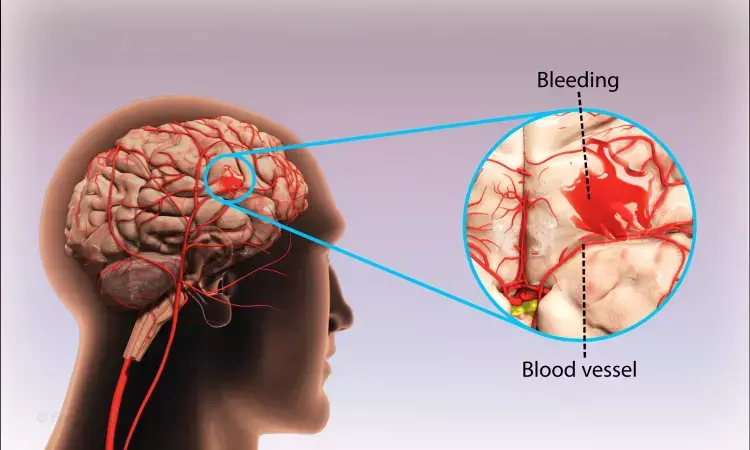- Home
- Medical news & Guidelines
- Anesthesiology
- Cardiology and CTVS
- Critical Care
- Dentistry
- Dermatology
- Diabetes and Endocrinology
- ENT
- Gastroenterology
- Medicine
- Nephrology
- Neurology
- Obstretics-Gynaecology
- Oncology
- Ophthalmology
- Orthopaedics
- Pediatrics-Neonatology
- Psychiatry
- Pulmonology
- Radiology
- Surgery
- Urology
- Laboratory Medicine
- Diet
- Nursing
- Paramedical
- Physiotherapy
- Health news
- Fact Check
- Bone Health Fact Check
- Brain Health Fact Check
- Cancer Related Fact Check
- Child Care Fact Check
- Dental and oral health fact check
- Diabetes and metabolic health fact check
- Diet and Nutrition Fact Check
- Eye and ENT Care Fact Check
- Fitness fact check
- Gut health fact check
- Heart health fact check
- Kidney health fact check
- Medical education fact check
- Men's health fact check
- Respiratory fact check
- Skin and hair care fact check
- Vaccine and Immunization fact check
- Women's health fact check
- AYUSH
- State News
- Andaman and Nicobar Islands
- Andhra Pradesh
- Arunachal Pradesh
- Assam
- Bihar
- Chandigarh
- Chattisgarh
- Dadra and Nagar Haveli
- Daman and Diu
- Delhi
- Goa
- Gujarat
- Haryana
- Himachal Pradesh
- Jammu & Kashmir
- Jharkhand
- Karnataka
- Kerala
- Ladakh
- Lakshadweep
- Madhya Pradesh
- Maharashtra
- Manipur
- Meghalaya
- Mizoram
- Nagaland
- Odisha
- Puducherry
- Punjab
- Rajasthan
- Sikkim
- Tamil Nadu
- Telangana
- Tripura
- Uttar Pradesh
- Uttrakhand
- West Bengal
- Medical Education
- Industry
Earlier anticoagulation reversal associated with better survival in patients with intracerebral haemorrhage: JAMA

USA: A cohort study including 9492 patients with anticoagulation-associated intracerebral haemorrhage (ICH) showed that a door-to-treatment time of 60 minutes or less is tied to lower mortality and hospice transfers. Stroke severity and White race were associated with faster administration of reversal interventions.
The study, published in JAMA Neurology, highlights the importance of rapid treatment in improving survival and discharge to hospice for patients with anticoagulation-associated ICH, underscoring the need for efficient healthcare delivery in emergency settings.
"In US hospitals participating in Get With The Guidelines–Stroke, earlier anticoagulation reversal is tied with improved survival for patients with ICH," the researchers reported.
Intracerebral haemorrhage is the deadliest subtype of stroke, and mortality rates are particularly high in anticoagulation-associated ICH. Recently, there has been the development of specific anticoagulation reversal strategies. Still, there is no clarity on whether there is a time-dependent treatment effect for door-to-treatment (DTT) times in clinical practice.
Kevin N. Sheth, Yale University School of Medicine, New Haven, Connecticut, and colleagues evaluated whether DTT time is associated with outcomes among patients with anticoagulation-associated ICH treated with reversal interventions.
The researchers used data from the American Heart Association Get With The Guidelines–Stroke quality improvement registry. It included patients with intracerebral haemorrhage who presented within 24 hours of symptom onset across 465 US hospitals from 2015 to 2021.
The primary outcome of interest was the composite inpatient mortality and discharge to hospice. Additional prespecified secondary outcomes were also examined, including functional outcomes (discharge modified Rankin Scale score, discharge venue, and ambulatory status).
Key findings of the study:
- Of 9492 patients with anticoagulation-associated ICH and documented reversal intervention status, 44.6% were female, and the median age was 77 years.
- A total of 7469 received reversal therapy, including 4616 of 5429 taking warfarin and 2856 of 4069 taking a non–vitamin K antagonist oral anticoagulant.
- For the 5224 patients taking a reversal intervention with documented workflow times, the median onset-to-treatment time was 232 minutes, and the median DTT time was 82 minutes, with a DTT time of 60 minutes or less in 27.7%.
- A DTT time of 60 minutes or less was associated with decreased mortality and discharge to hospice (adjusted odds ratio, 0.82) but no difference in functional outcome (i.e., a modified Rankin Scale score of 0 to 3; adjusted odds ratio, 0.91).
- Factors associated with a DTT time of 60 minutes or less included White race, higher systolic blood pressure, and lower stroke severity.
In the largest quality improvement stroke registry in the US, the researchers found that the earlier administration of reversal interventions in anticoagulant-associated ICH was linked with reduced in-hospital mortality or discharge to hospice but no difference in functional outcomes.
"These findings support intensive efforts to accelerate evaluation and treatment for patients with this devastating form of stroke," the researchers concluded.
Reference:
Sheth KN, Solomon N, Alhanti B, et al. Time to Anticoagulation Reversal and Outcomes After Intracerebral Hemorrhage. JAMA Neurol. Published online February 09, 2024. doi:10.1001/jamaneurol.2024.0221
Dr Kamal Kant Kohli-MBBS, DTCD- a chest specialist with more than 30 years of practice and a flair for writing clinical articles, Dr Kamal Kant Kohli joined Medical Dialogues as a Chief Editor of Medical News. Besides writing articles, as an editor, he proofreads and verifies all the medical content published on Medical Dialogues including those coming from journals, studies,medical conferences,guidelines etc. Email: drkohli@medicaldialogues.in. Contact no. 011-43720751


